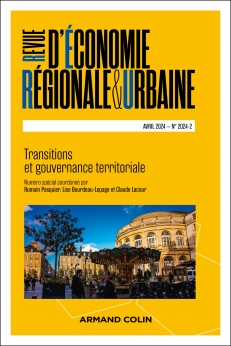
REVUE D'ÉCONOMIE RÉGIONALE ET URBAINE (2/2024)
Pour acheter ce numéro, contactez-nous
Recevez les numéros de l'année en cours et accédez à l'intégralité des articles en ligne.
Depuis les années 2010, des initiatives de la société civile se déploient dans les domaines de l’environnement et de l’économie sociale et solidaire. Elles constituent un ensemble hétérogène de collectifs qui se saisissent de problématiques socio-environnementales dont les porteurs estiment qu’elles sont insuffisamment prises en charge par les pouvoirs publics. Les actions engagées sont diverses : amélioration du cadre de vie, protection de l’environnement, alimentation saine, recyclage, réemploi, mobilités douces, énergie renouvelable. Au-delà de leurs spécificités, il s’agit de comprendre à quel type de transformation socio-écologique ces mobilisations participent. Dans cet article, nous analysons la manière dont ces collectifs, en adressant de manière conjointe les problématiques sociales et environnementale et en proposant des expérimentations collectives de changement des pratiques du quotidien offrent des capacités de résistance ou esquissent des propositions alternatives aux régimes sociotechniques, politiques et économiques dominants. Pour ce faire, nous nous appuyons sur les cas de deux communes du Grand Paris, Clamart et Ivry-sur-Seine.
Since the 2010s, civil society initiatives have been developing in the fields of the environment and the social economy. They constitute a heterogeneous group of collectives tackling socio-environmental issues which, in the view of their promoters, are insufficiently addressed by public authorities. The actions undertaken are diverse: improving the living environment, protecting the environment, healthy eating, recycling, reusing, sustainable mobility, renewable energy. Over and above the specific features of their activities, the aim is to understand the type of socio-ecological transformation to which these mobilizations are contributing. These collectives usually start from observations of the malfunctioning of existing political and economic systems, both in terms of their impact on the environment and on health, as well as the loss of social ties and the weakening of collective capacity to act. They then form "publics" (in Dewey’s sense) to intervene in the regulation of problems, offering local spaces and means of resistance to the dominant socio-technical, political and economic regimes. Their approach to transition issues is transversal, in the way they integrate social and environmental issues and raise the question of change from the perspective of everyday practices. In this article, we analyze the contributions of these collectives to socio-environmental transformations from two complementary angles. The first is that of experimentation, based on the idea that citizens are endowed with agency and a capacity to test concrete solutions to problems that concern them. The second concerns the relations that these collectives maintain with local public authorities, and their contribution to a more or less advanced democratization of climate issues. To do this, we draw on the contrasting cases of two Greater Paris communes, Clamart and Ivry-sur-Seine. The comparison allows us to analyse the influence of local contexts and socio-political trajectories on the potential for local social-ecological transformation.